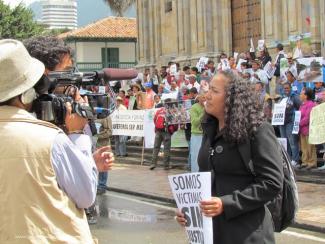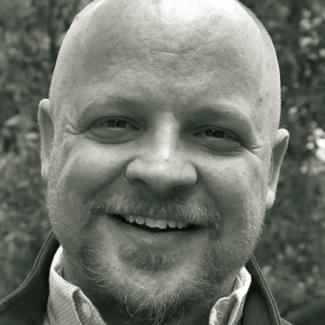Media
Supporting journalists as peace builders
[ By Rousbeh Legatis ]

It is difficult to assess the impact of journalism on social change in conflict countries. However, in Colombia it is quite evident that journalists play a major role in peacebuilding. The country is marked by a conflict that started in the 1960s as an armed insurrection of rural guerrilla organisations against the state. Ever since, Colombia has changed in dynamic ways.
Paramilitaries and the drug economy have contributed significantly to the tensions. Armed clashes take place in an environment of patronage and violence, thus continuing to fragment and polarise a society suffering from extreme inequality. Who contributes or benefits from violence in Colombia is constantly changing, though ordinary people always suffer the most.
The media’s double role
The media is one of the most important actors involved in the conflict that has a say in which direction the peacebuilding process is going. Adam Isacson of the Washington think tank Center for International Policy (CIP) points out that “journalists’ search for exclusive scoops can kill the peace process by sensationalising setbacks and exaggerating every misunderstanding”. On the other hand, the Latin America expert also says that “the independent media are doing the job of a hundred NGOs by exposing human rights’ violations or the infiltration of the state by armed groups”. In his view, the weekly magazine Semana “is a fine current example”.
Without the Colombian media, many scandals would never have been revealed. Links between paramilitaries and the government, secret service support for armed actors (DAS scandal) and the deliberate killing of civilians who, as it turned out, were subsequently dressed as guerrilla fighters by the armed forces (the “false positives“ scandal) – none of this would have been made public. Reporters have covered relevant topics that were long ignored. The media forced the government to respond.
Given the situation of Colombian media, these journalistic achievements are remarkable. The media landscape is centrally organised and holds enormous economic power. Moreover, it is focused on the big cities.
Political influence
Many media corporations are in private hands. Traditionally, relationships between journalists and the political and economic elite are close. Labour conditions are tough, employees do not enjoy many rights and there is little job security. The agenda of President Álvaro Uribe is thus often reflected in the news coverage, according to Omar Rincón, a professor of journalism. Political pressure and confrontation with armed actors is part of everyday journalism.
The scope for covering other topics and social actors is getting smaller and smaller. Moreover, there is a perverse trend of “rejuvenation” in editorial departments, Rincón says. “Less and less experienced journalists are engaged, which results in less payment and more work for stories that don’t ask hard questions.”
Particularly in rural areas, problems are exacerbated. Nevertheless, besides the radio, newspapers and magazines are especially relevant in Colombia, Rincón argues. “People don’t read much, but the print media is very important because it influences the decisions of economically and politically powerful people.”
The journalistic contribution to peacebuilding in Colombia is hardly talked about. Meanwhile, journalists’ problems haven’t dwindled or become less complex. But there are efforts to support journalists and editors. This is shown by the increase of media-assistance organisations and journalist associations throughout Colombia over the last twenty years. They are trying in many different ways to cope with the problems of Colombian journalism.
“In general, there was no balanced way of dealing with the conflict. Wording was often irresponsible, journalists were taking sides in different ways and the media changed the war into a spectacle – out of commercial interest and to enhance TV viewing figures,” says Eduardo Márquez. For this reason he and others founded the journalists association Medios para la Paz (Media for Peace, MPP) ten years ago. Back then, the media was only aggravating the conflict, not adequately informing about it. Government opinions were reproduced uncritically, sources weren’t questioned and the news was imparted without background information.
The strategy of the “Media for Peace”
Because such problems persist, MPP actively supports responsible, high-quality journalism geared towards managing conflict in a reasonable way by assessing the causes, dynamics and background of events. Responsible journalism thus contributes to a culture of peace and the establishment of democratic deliberation and accountability. Over the last ten years, former MPP director Gloria Moreno considered it most important to sensitise colleagues “to the other war, the one of disinformation, which every soldier has to fight against in order to seize hold of the truth”.
MPP has a methodical and practical approach consisting of three areas:
– vocational training and qualification,
– investigation (primarily as a process of research and reflection) and
– information of the public (through events, internet and publications).
The results include a guidebook of terms and definitions relevant to conflict, in order to “disarm” the journalistic jargon, as well as several manuals for journalistic work with different specific issues. International organisations and donors are interested in vocational training and have provided 95 % of MMPs funds.
The main focus of MPP is on the situation of journalists in rural areas. Eduardo Márquez explains the approach: “We noticed soon that journalists’ situations in other parts of the country were substantially different from the conditions in Bogotá. The more we came to grips with it, the more we realised what the journalists needed. Before, that had not been understood.”
According to MPP, over the last ten years there were workshops in 28 communities with 1,830 journalists from 841 different media or other institutions. MPP activists are particularly proud of the Diplomado, a six-month training programme for journalists working in the “zonas rojas”, the most turbulent conflict regions of the country. The programme was developed in cooperation with the Ponteficia Universidad Javierana and the Centro de Investigación y Educación Popular (Centre for Investigation and Popular Education, CINEP). It is about “responsible journalism in armed conflicts”. More than 280 journalists from seven conflict regions have participated in the Diplomado programme.
In addition, the programme Reporteros de Colombia was established. Journalists can find practical support here to strengthen and improve the quality of their work.
Focus on regional specialities
In every conflict region, local particularities have to be taken into account during project implementation. Freddy González, responsible for organising the Diplomado until 2009, says: “If we are dealing with a region like Nariño or Putomayo, we have to take into account the drug traffic and its impact on the conflict. If we are working in Barrancabermeja, it is impossible not to consider the region’s abundance of natural resources as well as their distribution, as this is exactly the kind of conflict we’re dealing with in that particular region. In la zona norte we have to take into special consideration both the border-relevant topics and the problem of paramilitary control.”
In order to improve support of journalists in the long run, especially in rural areas, MPP relies upon cooperation and coordination with other organisations. The Proyecto Antonio Nariño (PAN) is an alliance of MPP and four other organisations. Besides their main objective of supporting freedom of press and opinion, PAN is working towards a better coordination of journalistic support programmes.
Obviously, the media cannot solve all conflicts. But, as the case of Colombia shows, journalism plays a significant role in peacebuilding and deserves to be supported.








